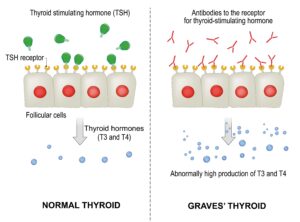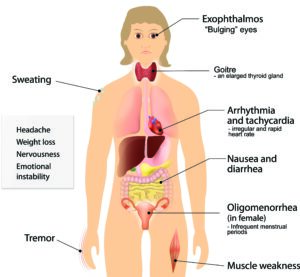What is Graves’ disease
Graves’ disease is an autoimmune disorder that causes hyperthyroidism, or overactive thyroid, resulting in excessive production of thyroid hormones. Symptoms include weight loss, increased appetite, rapid heartbeat, sweating, and nervousness. It is treated with medications, radioactive iodine therapy, or surgery to remove the thyroid gland. Graves’ disease is named after an Irish Physician, Robert James Graves who was one of the first doctors to describe the symptoms associated with Graves’ disease.
What causes Graves’ disease

Graves’ disease is caused by an autoimmune reaction, where the body’s immune system produces antibodies that stimulate the thyroid gland to produce excessive amounts of thyroid hormones. The exact cause of this autoimmune reaction is not fully understood, but it is believed to be a combination of genetic and environmental factors.
What are the symptoms and signs of Graves’ disease

How is Graves’ disease diagnosed
Graves’ disease is diagnosed through a combination of medical history, physical examination, and laboratory tests. The following tests may be used to diagnose Graves’ disease:
- Thyroid-stimulating hormone (TSH) test: TSH blood levels are measured to determine if they are suppressed, which indicates an overactive thyroid.
- Thyroid hormone levels test: Blood tests to measure the levels of thyroid hormones, thyroxine (T4) and triiodothyronine (T3), will be elevated in Graves’ disease.
- Thyroid-stimulating immunoglobulin (TSI) test: A test to measure the level of TSI, which is an antibody that stimulates the thyroid gland and is present in many people with Graves’ disease. This is not regularly tested.
- Thyroid scan: A scan using a small amount of radioactive material and a special camera to produce images of the thyroid gland, which can help determine if the gland is overactive.
- Physical examination: A physical examination to check for signs of Graves’ disease, such as goitre (enlarged thyroid gland), bulging eyes (Graves’ ophthalmopathy), and skin changes.